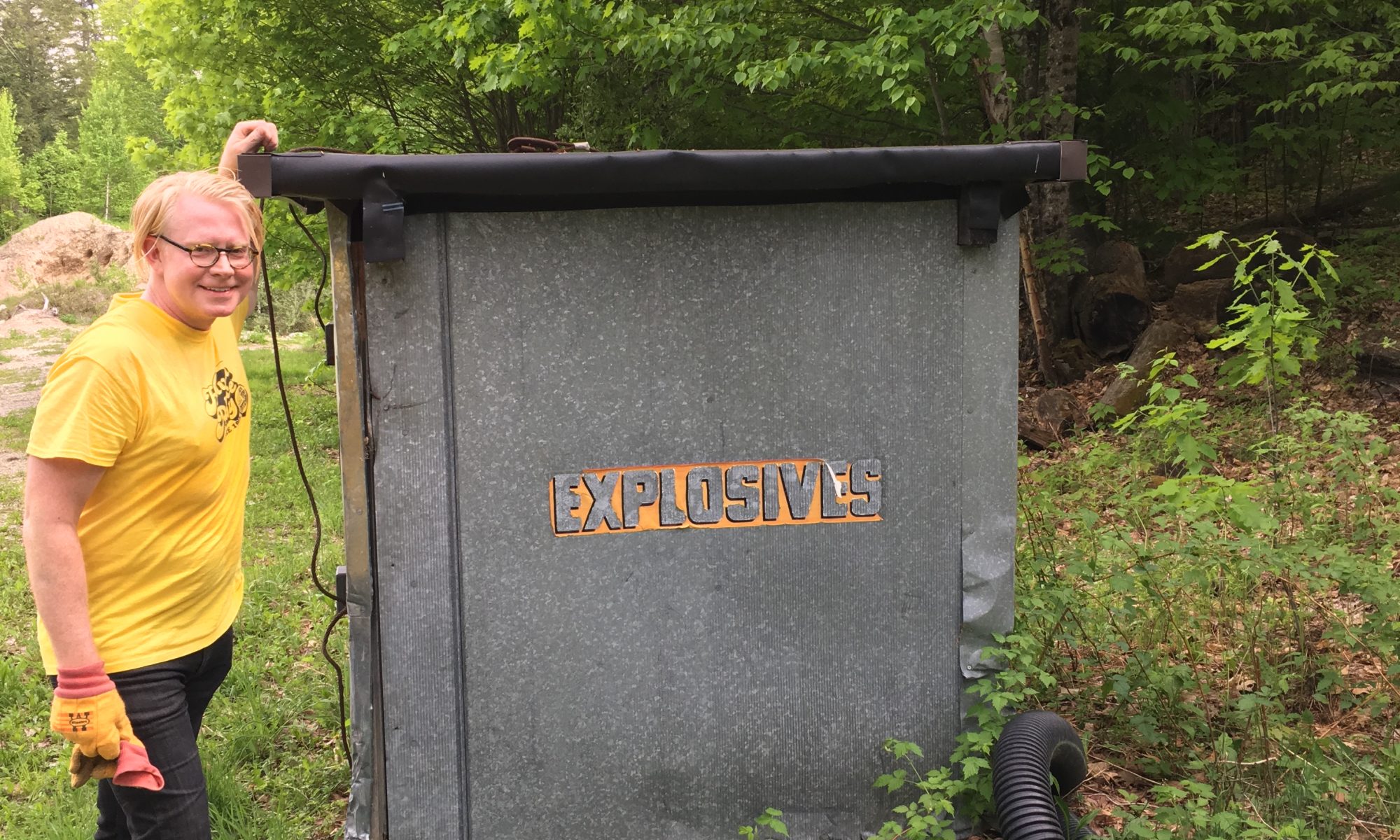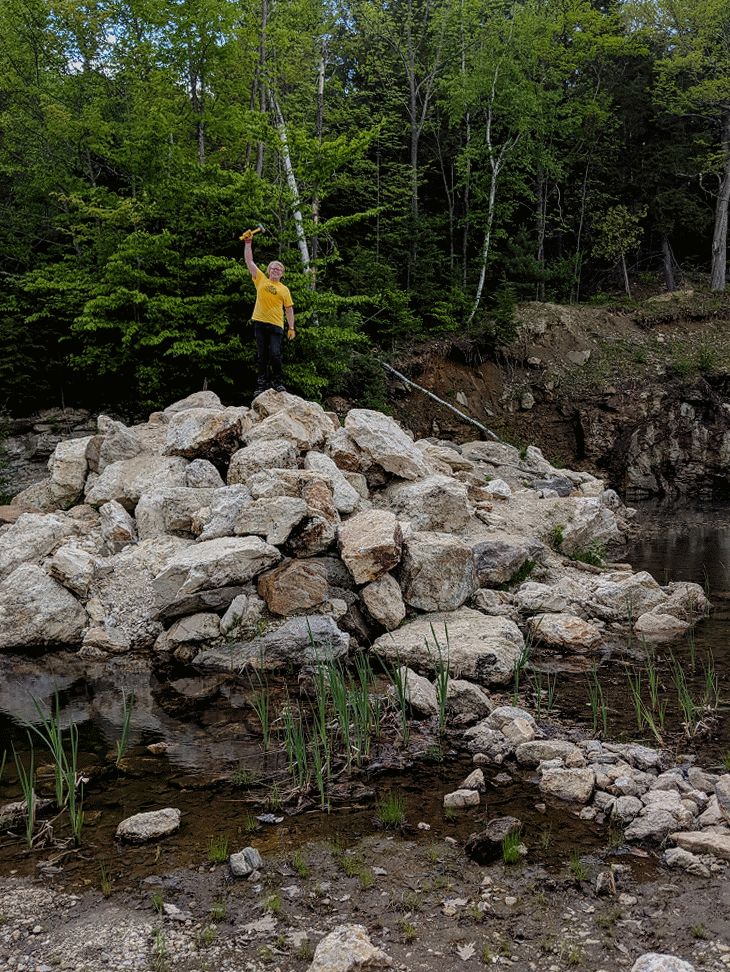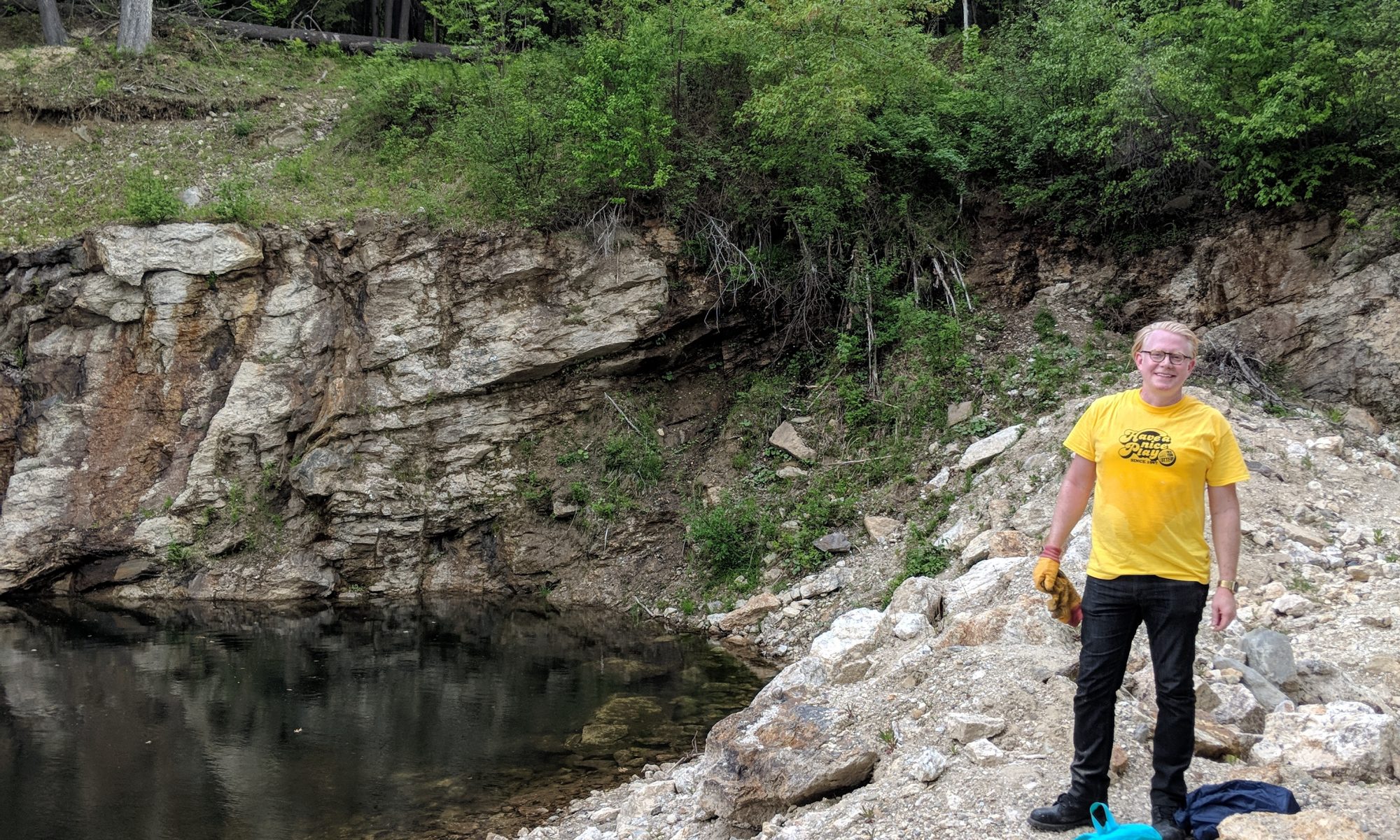“Nice Tools if You Can Get ‘Em”
Depending on one’s budget, your mode of transportation, your style of backpack or wagon, and the number of rockhounds in your party, a number of other tools can be helpful, and can be used depending on the locale, public versus private lands for instance.
One time we had returned from collecting geodes from a dried up creek bed in Southern Indiana. We had driven out to Southern Indiana, filled the trunk of the rental car with geodes (probably stripped the shocks on the back wheels of the poor rental car too), and drove back to Manhattan’s Upper East Side. We had a strategy, and tool in mind to crack the baseball to honeydew melon sized geodes, but we had one geode the size of a basketball, and no idea how to crack it. As we were driving through Manhattan, we saw some street workers repairing a section of street using a jackhammer. We were able to pull over and get the attention of the city workers, and we asked “Gentlemen, any chance you could help us out and crack open a giant geode for us please? We’ll gladly pay you.” The city workers looked at each other, and then told us to “get the hell out of here.”
So we decided to get our own jackhammer!
- A jackhammer is a very advanced tool, for use by more than one person, with all of the protective gear we have discussed already from gloves to earplugs to protective glasses and goggles. As alternative to the large upright jackhammer used commonly by city and construction workers is called a demolition hammer, sometimes a concrete breaker or electric jackhammer. They are still heavy-duty tools that require fully understanding the instructions, and adult supervision, goggles and protective gear, and more than one person to help out and act as a spot. However, the hand jackhammers are designed to be held up to crack rock at an angle as well as vertically, and for cracking a rock façade with seams and crevices, the hand jackhammer is the fastest way to expose new stone surfaces. They are electrically powered, so require a generator, something else to transport to your site.
“Points” to consider before Investing in a mini jackhammer:
- Consider your budget for such a heavy-duty power tool, and the gas powered generator that is required. Does it make sense?
- Consider storage of this large tool and generator.
- Can you lease a generator from a hardware store near your rockhounding site?
- Does your car or truck logistically accommodate a generator, and are the rockhounds on this adventure ready to haul this very heavy equipment.
- Power tools like an electric jackhammer can only be used on private property, if not your property, then with advance knowledge and permission asked beforehand of the property owner.
- “Diamond Tip” – For instance, we have hunted for geodes in Southern Indiana on the property of a personal friend from college whose farm is surrounded by acres of forest that contain an eternity’s supply of geodes. He allows us to use a jackhammer and generator on his property to crack open the largest geodes that we could otherwise not move. As well, when we mine for Herkimer Diamonds in upstate New York, we have access to a claim on private property. The land owners receive an annual fee to mine a specifically designated area in the spring and fall. With that annual fee and right to the claim comes the permission to use power tools. So the instances where one can use a jackhammer are not plentiful, but if they are allowed, the return in ease of moving and removing rock is worth the financial investment and sweat the jackhammer requires. The stone in which Herkimer Diamonds are found in upstate New York is very hard dolostone, similar to limestone. It has very few crevices, breaks, or cracks at the depth below underground where the “pockets” of Herkimer Diamonds are found. So the jackhammer allows on to break open a smooth surface of dolostone, and break it apart section by smaller section until you uncover a cavity filled with Herkimer Diamonds.
- We have a friend who always carries half a dozen crow bars in his truck. Crow bars are very useful when prying apart a very large stone. As you crack open a seam in a large rock, you insert the crow bar to sustain the pressure. Then continue the seam and pry it open even further with another crow bar. By using multiple crow bars, one can open up and split a very large rock, into more manageable sections.
- Some rockhounds prefer to carry a walking stick, like the ones used for hiking along trails. The terrain is likely going to be rough and rocky wherever you are, and if your rockhounding locale is on the side of a hill or mountain, or down a ravine, or along a river or creek bed a walking stick may be very helpful to help maintain one’s balance and coordination.
- Specifically for geodes, the soil pipe cutter, an old hand tool used by plumbers and water department workers, can be repurposed into a very effective geode cracker. We bought ours off of eBay, and it remains at home for geode cracking after the geode collecting. It is a steel lever with a chain with teeth, and the chain would wrap around a water or sewage pipe, and then by applying pressure to the handles, and tightening a crank that tightened the pressure of the chain, a plumber was able to split apart water and sewage pipes. The same physics principles apply when you wrap the chain around a geode. With enough pressure the geode splits in half.
- Simon & Schuster publish a series of books about identifying trees, birds, and wildlife. If you are rockhounding with kids, any of those books can help motivate and encourage some additional activity and curiosity in nature.
- Rockhounding is a passion for men, women, and youngsters who appreciate nature, and natural beauty, and also satisfies a streak and desire for treasure hunting in many of us. The challenges that face rockhounds, such as dwindling areas where one can explore and rockhound, access to private property being limited and denied by land owners protecting themselves, are many of the same challenges that face our brothers and sisters who explore with metal detectors. Many rockhounds are fascinated by gems, minerals, and crystals, as well as fossils. Some rockhounds only seek out gems and minerals, but some rockhounds are also metal detector enthusiasts. If that rockhound is you, then pack your metal detector and toggle between detecting and rockhounding if you are in a local where both are applicable.
Rockhounds and Metal Detector Enthusiasts Unite!




